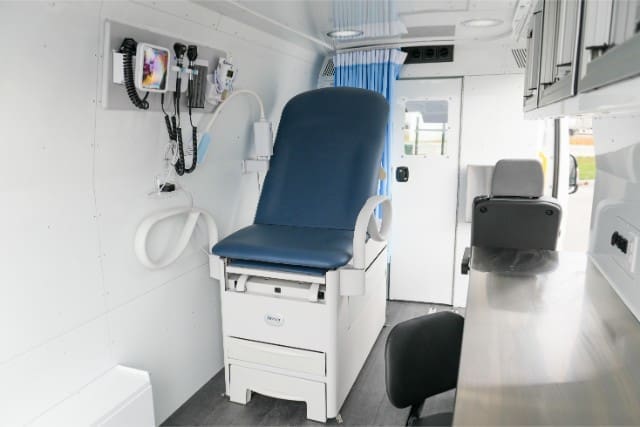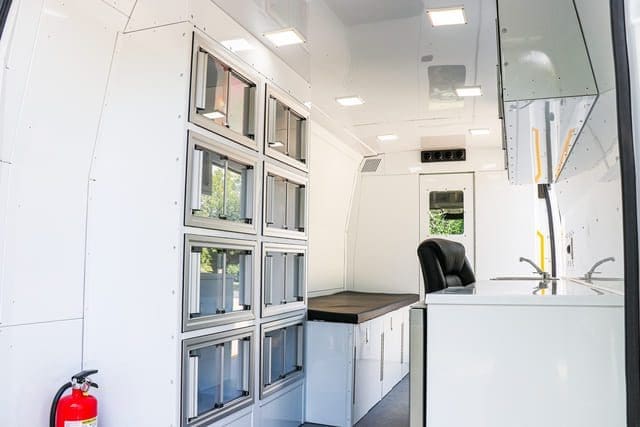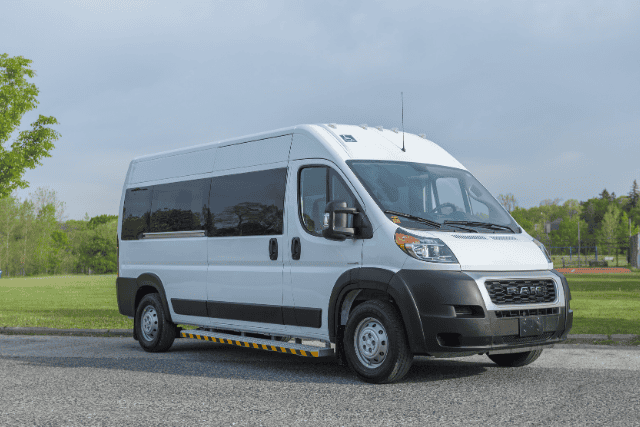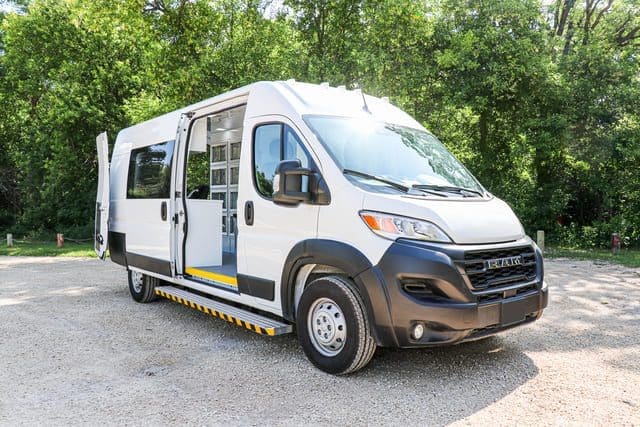Did you know that 75% to 99% of the organizations we talk to mention that government funding for mobile healthcare programs is a major challenge? Maybe you’re here because your organization feels the same way. You’ve put so much effort into developing your mobile healthcare program but running into roadblocks because there simply isn’t enough financial support can be frustrating.
Without enough government funding, your program can stall or even fail to get off the ground. Maybe you’re already worrying about how to make your vision a reality, how to serve underserved communities, or even how to just keep your program running. This article will give you some clarity on how it affects your program and what you can do.
At AVAN Mobility, we’ve been designing and building custom mobile health clinics for organizations like yours and CalOptima for over 10 years. We’re passionate about reducing barriers to healthcare and transportation because we believe that everyone deserves access to the care they need—no matter where they live.
Of course, we understand that we’re not the only company out there, but our experience has taught us a lot about the unique challenges that come with running a mobile healthcare program, especially when funding is tight.
In this article, you’ll learn how a lack of government funding affects your mobile healthcare program and what you can do to navigate these challenges. Let’s get started.
Lack of government funding means fewer lives saved across the U.S.
Starting a mobile healthcare program can be really exciting, but it’s a huge letdown when you hit a roadblock like not getting the government funding you were hoping for. A lack of government funding can cause all sorts of problems that are bigger than just not being able to start a mobile clinic program. Take a look at the video below to see how much a mobile medical van can cost and get a better idea of why government funding is so important.
Let’s take a look at three problems you might run into or are already experiencing.
1. More people will die
One of the biggest problems caused by poor government funding for mobile healthcare programs is that fewer lives are saved. Mobile clinics are essential for providing vaccines, check-ups, preventive care, and treatments for people who can’t easily access regular healthcare. But without funding, it’s hard to keep these clinics going.
What else could this mean?
Fewer patients served: Mobile clinics may not reach as many people as possible without the right funding.
Delayed treatments: Patients might have to wait longer for the care they need. By the time they do get healthcare, it could be too late.
Worse health conditions: Without regular healthcare, conditions like diabetes or high blood pressure can get worse.
2. Missed chances to expand mobile healthcare services
Without enough funding, growing your mobile healthcare program is almost impossible. Expanding means reaching more people, offering more services, and ultimately saving more lives. But growth costs money, and without government support, it’s hard to make that happen.
Think about it: Expanding your mobile healthcare program means you need more vehicles, more staff, and more equipment. All of that adds up quickly. Without funding, you miss out on the chance to help more people in new areas.
What else could this mean?
No new locations: You may be stuck serving the same areas, even if other communities need help, too.
Fewer services: Without funding, you can’t offer more services, like mental health care or specialty treatments.
Lost partnerships: You might not have the resources to team up with other healthcare providers.
3. Struggling to keep things running
Even if you’re not looking to grow, just keeping your mobile healthcare program going can be tough without enough funding. Keeping the vehicle in good shape, paying staff, and buying medical supplies all cost money. And if the money runs out, your clinic may not be able to run at all.
If the vehicle breaks down or you run low on supplies, you could be forced to cancel visits, leaving the people who depend on you without care.
What else could this mean?
Reduction in patient visits: You might not be able to visit communities as often, limiting access to care. This can have a major impact on someone who needs regular dialysis treatments a few times per week.
Staffing issues: If you can’t pay your team, you might lose key staff members.
Old or broken equipment: Without the funds to replace or fix medical equipment, the quality of care can drop.
Maintaining your mobile healthcare program without enough money is a constant struggle, putting the people who rely on you at risk of losing access to care.
Keep reading to learn about a few things you can do to overcome a lack of government funding for your mobile healthcare program.
What you can do to get around a lack of government funding
Dealing with a lack of government funding can be tough, but it’s important to stay persistent. New grant and funding opportunities are always popping up, and keeping a close eye on these can steer you in the right direction.
We’ve written several articles on mobile health grants that can guide you through the process—check them out below.
- A guide on securing grants for mobile health clinics in the U.S.
- Top 6 ways to apply for mobile health grants
When government funding isn’t available, you sometimes need to think outside the box. Other methods, like fundraising, can be a great way to get your mobile clinic off the ground or keep it running.
Whether it’s reaching out to local businesses, holding community events, or launching an online campaign, there are plenty of ways to generate the support you need. Be sure to check out our top 10 tips for fundraising for a mobile clinic article for more ideas on how to make it happen.
Even without government backing, there are still ways to move forward and keep making a difference.
Start overcoming funding challenges in your mobile healthcare program

You most likely landed on this article because your organization is struggling with getting funding to start or keep your mobile healthcare program running. We know how tough this challenge can be.
After reading this article, you now have a better idea of how a lack of government funding can affect everything from:
- Saving lives
- Expanding mobile healthcare services
- Maintaining operations
You also learned about a way to navigate these hurdles, like seeking alternative fundraising opportunities.
At AVAN Mobility, we believe in breaking down barriers to healthcare and transportation because we know the difference it makes in people’s lives. Our goal is to guide you every step of the way, whether it’s through funding solutions, vehicle design, or just offering the support you need to get your program up and running. If you have any questions, click the button below to talk to a mobility expert.





